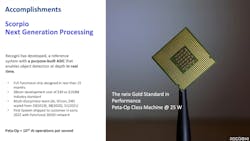Automotive AI Chip Delivers Real-Time Computations
Check out more of our CES 2023 coverage.
Recogni's new Scorpio chip targets automotive advanced driver-assistance systems (ADAS) and self-driving cars. The tiny 10-mm2 chip consumes about 25 W to deliver one petaoperation per second (1,000 TOPS) machine-learning/artificial-intelligence (ML/AI) performance (Fig. 1). I talked with co-founder and Chief Strategy Officer R.K. Anand about the announcement.
The chip is designed to handle video streams from multiple high-resolution cameras in real-time to provide situational awareness to the car's control system. It takes data directly from the cameras, processes it, and provides the results to the host using on-chip memory. This allows the system to operate within real-time constraints with low latency.
The real-time operation and high performance enable it to provide accurate details up to 300 m using higher-resolution cameras than those currently employed in automotive applications. Its ML models can not only identify objects in a video, but also determine their position and distance. Most other ADAS systems employ radar, LiDAR, or have stereoscopic cameras to compute distance.
Recogni's advantage is the integration of the results that must be done when combining distance data with imaging data when using separate sensors. This all can be done in a cycle time of under 10 ms.


